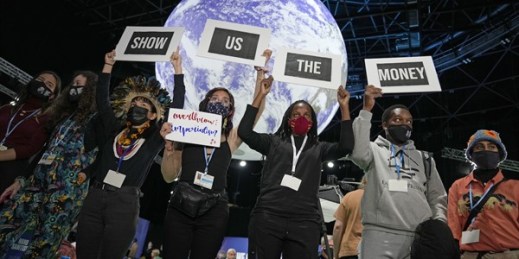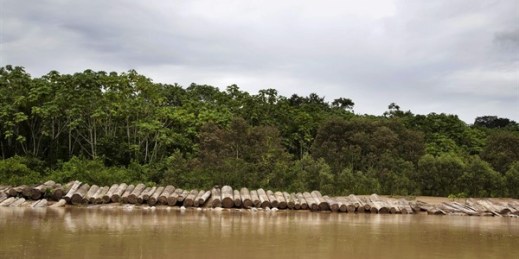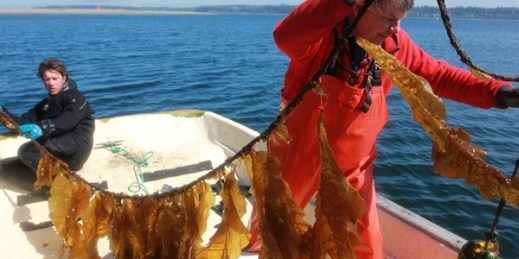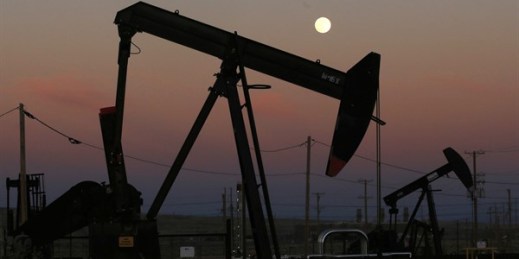Environment Archive
Free Newsletter

Though many of us hoped that 2021 would bring some relief after the trials and tribulations of 2020, this year has been a bumpy ride. On Jan. 6, just one week into 2021, supporters of former U.S. President Donald Trump stormed the Capitol in Washington—an international beacon of liberal democracy. This seemed to set the tone for the rest of the year. Everywhere, anti-democratic, misogynistic and racist forces made gains; in particular, the Taliban’s takeover in Afghanistan this summer left many despondent about the country’s future. And all the while, the coronavirus pandemic continued to wreak havoc, especially on the lives of those who are victims of global vaccine inequity. In the middle of all this chaos, though, […]

Peru’s portion of the Amazon jungle accounts for more than half the country’s land area and, at 13 percent of the Amazon’s total territory, the second-largest share of the rainforest after Brazil. While the rate of deforestation of Peru’s Amazon forests lags that of Brazil’s, it is the country’s primary source of greenhouse gas emissions. Growing concerns over both deforestation’s contribution to climate change and its impact on the region’s Indigenous peoples have now led the Peruvian government to increase its focus on combatting the phenomenon. Though Peru is not a significant producer of greenhouse gases, it is likely to suffer immensely from climate change and has already […]

Could the oceans—where life once evolved—help save the planet and humanity from climate catastrophe? A new report suggests they might. Released on Dec. 8 by the U.S. National Academies of Sciences, Engineering and Medicine, or NASEM, the study explores tantalizing possibilities for drawing carbon out of the atmosphere and sequestering it in the oceans through a mix of nature-based solutions and technological innovations. Getting these climate interventions to scale will of course be a significant challenge. But another challenge may be just as difficult to solve: reconciling these solutions with international law and state obligations. Notwithstanding incremental progress at last month’s United Nations climate […]

When I first joined the WPR editorial team and took over Africa Watch, I wrote an inaugural edition introducing myself and my guiding principles, as well as the trends, topics and developments you could expect to see me cover in the newsletter as well as in my other writings for WPR. It’s now been six months since I began writing these newsletters, an experience that has been as remarkable as it has been exciting. And while the newsletter’s format has since evolved, I would like to believe that the orientation I set out in that edition has largely remained intact. During […]

Olaf Scholz of the center-left Social Democratic Party, or SPD, was sworn in yesterday as Germany’s ninth chancellor, ending the 16-year tenure of Angela Merkel and her center-right Christian Democratic Union, or CDU. But while in other countries a swing from the right to the left might herald significant change politically, this is unlikely to be the case in Germany, which is known for its preference for pragmatic, consensus-oriented political leadership. A key point to note is that Scholz was a member of the previous government, serving as vice chancellor and finance minister in Merkel’s fourth and final Cabinet, as […]

Young people across the world are struggling to find work. Even before the pandemic hit, young people were three times more likely to be unemployed than those over the age of 25. And one in five met the criteria for what the international system characterizes as NEET—for “not in education, employment or training”—meaning they weren’t gaining experience in the labor market, receiving an income from work or enhancing their education and skills. Now, the pandemic has demonstrated that in a crisis, young workers are also among the first to lose their jobs. More than one in 10 young people—aged 16 to 25—were forced to […]

The 2015 Paris Agreement on climate change contains a curious omission: The phrase “fossil fuels,” which appears nowhere in the nearly 7,200-word document. Nor do the terms “coal,” “oil” or “natural gas,” despite these resources being responsible for most greenhouse gas emissions. That lacuna was no accident. It reflects the decision by national governments, reinforced by industry lobbyists, to focus emissions reduction efforts on reducing the demand for fossil fuels, rather than limiting fossil fuel supply by discouraging or even prohibiting their extraction in the first place. In other words, as climate activist Tzeporah Berman points out in a powerful […]

